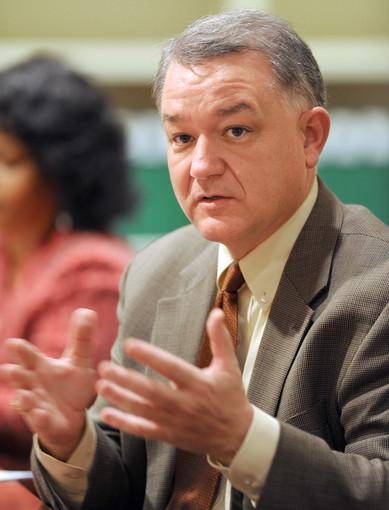By Daniel Menefee
Dan@MarylandReporter.com
Floor debate in the House over the administration’s signature land preservation bill invoked common themes from Republicans about growing state control over rural and agricultural land use, but the bill passed with a vote of 93-45.
“This is not about oversight, this is about control,” said Del. Michael McDermott, R-Wicomico. “You will literally shut down development in the rural parts of the state.”
The bill will require county governments to establish a four-tier system for septic use, aimed at protecting agricultural lands and forests. But Republican lawmakers say the bill is too restrictive and an affront to property rights.
The bill establishes the size and scale of major developments using septic systems and encourages a migration of development closer to priority funding areas that can be served by sewage treatment plants. Counties have until the end of the year to add their tier designations to their comprehensive plans.
McDermott referenced astronaut Neil Armstrong’s words during the Apollo 11 moon landing in 1969.
“That was one small step for a man, but this is one giant leap for this General Assembly when you step forward with this process,” McDermott said. “You are dictating a mandate by the state of Maryland over county governments…who have spent their time to debate how their county will grow and develop.”
Del. Mike Smigiel, R-Caroline Cecil, likened the bill to an authoritarian regime in Cambodia in the late 1970s.
“There is no compensation for the loss of property rights,” Smigiel said. “If you remember a few years back, if you’re a student of history, the Khmer Rouge came into power and moved everybody out of the cities, out into the country. We’re doing just the opposite.”
CORRECTED: Environmental Matters Committee Chairwoman Maggie McIntosh, D-Baltimore-Montgomery, said the Senate bill was amended to give final decision making authority to local governments. Her Committee voted favorably on the Senate bill Wednesday.
The bill as amended requires local authorities to consult with the Maryland Department of Planning when drawing their tier maps, and hold a public hearing in the event the state and a local jurisdiction are in disagreement about the tier designations. The local authorities will have the final say, McIntosh said.
The bill initially drew objection from the Maryland Association of Counties, but they withdrew their objections when the bill was amended in the Senate.
Farmers are also concerned the development restrictions in the bill reduce the value of land and therefore reduce the equity they can borrow on to buy supplies and equipment.
Del. Herb McMillan, R- Anne Arundel, the only Republican to vote for the bill, said the amendments restored final authority to the locals to determine their tier designations. Without the amendments, he said he would be echoing the same sentiments as his Republican colleagues.
He indicated that the amendments were actually a victory for local governments and that lawmakers opposed to the original bill should declare victory.
“Sometimes…you should acknowledge that you won and move on,” McMillan said. “I served in local government and I think this a reasonable bill. I think it’s a good piece of legislation.”
Counties would establish septic tiers
Under the amendments, local jurisdictions can draw their own tier maps. They must consult with the state planning department and hold a public hearing if there is disagreement between the state and a jurisdiction. But the local jurisdictions are not bound by the recommendations of state planners.
UPDATED: Tier-one areas are served by local water and sewer systems and where growth is essentially maxed out.
Tier-two areas are planned growth areas where water and sewer will be extended from existing municipal water systems.
Tier-three is a mix of areas that allow septic use and also prohibit major subdivisions on septic in designated areas.
These areas are not planned for sewer and are a mix of agricultural and forest lands. The tier-three language in the original bill drew much ire from farmers, builders and developers.
Farmers were especially concerned that tighter state controls on land use would lower property values, Middleton said.
Tier-four is designated as protected forest lands under the bill.
A “major” subdivision is eight lots or more per subdivision under the bill, but may vary depending on the county.







OweMalley’s PLAN(to screw)MARYLAND moves ahead. Hope he’s happy when all the ‘makers’ leave the state, leaving only ‘takers’.
And, talk about ‘property rights’. What a joke. How’s this one for Maryland state LUNACY?: We considered putting in solar panels on our roof, for more efficient heating, but were told by the solar company that it would not work unless we removed trees, because we have TOO MANY TREES shading our home. But when we filed for a building permit to put an addition on our home – we are told WE MUST PLANT MORE TREES (since we are in ‘critical area’). These sick, greeny goons don’t know whether they are coming or going !!!! We all need to get bumper stickers that say: Welcome To Maryland, What’s In Your Wallet? and/or Welcome to Maryland, the Free State JOKE !!!
Del. McIntosh is from Baltimore City, not Montgomery Co. Additionally, what has been left out of the “property rights” portion of this debate is that the use of septic allows one property owner to pollute the land and water of their surrounding neighbors. This bill is to protect property rights and clarify the limits on the ability of one property owner to reduce the value of the properties around them.
Property rights? What property rights? It seems the only RIGHT MD taxpayers have it the right to be taxed from cradle to grave on anything & everything the Democrat controlled legislature decides should be a source of revenue. And we keep asking, where have all the tax, toll, & fee $$ gone? The budget increases year after year, with new perks for certain protected voting districts added, yet we’re continually told Annapolis NEEDS more money or kids won’t get educated, criminals will run rampant due to police cuts, roads & bridges will collapse, homes will burn because of fire dept cuts, etc. But the same question just keeps popping up, what have they really been doing with OUR precious tax $$?
Abby,
Obviously, the Maryland voters who continue to re-elect these morons, MUST LOVE having their rights savaged and themselves being abused and robbed…
Del. Smigiel is from Cecil County, not Caroline as the article states. However, his district includes Caroline,Kent and Queen Anne’s counties as well as Cecil County.
Thanks for helping us catch the error, which we regret making in the first place. The story has been corrected. –Megan Poinski, Associate Editor
you know Screw this state Im taking my family and moving back to TN. and thell the Azz clown Omally to stick his head in a lake and breath deep… If I own the land keep your nose out of it, Its My land.